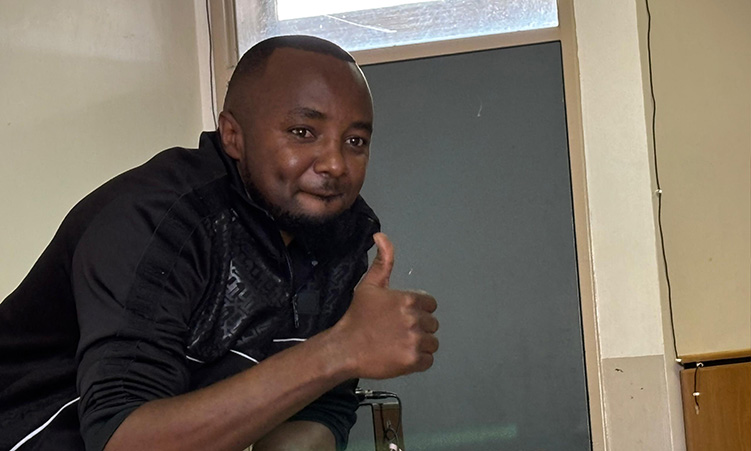THE gloves have come off in an increasingly acrimonious spat between investment firm Global Vision Trust, its would-be BEE partner Circle Investments (Pty) Ltd and the Chairman of the Government Institutions Pension Fund, Maru Tjihumino, over a share in the Swakopmund Waterfront Development Company (SWDC).
Both Global Vision’s Brett Jolly and Tjihumino have now indicated that they intend suing each other for defamation of character after Tjihumino on Friday issued a six-page statement, with several attachments, to “clarify” his position. Tjihumino is currently suspended as chair of the GIPF Investment Board while they investigate allegations of unethical behaviour in respect of his alleged involvement in Circle Investments.In a six-page statement issued late on Friday, Tjihumino repeatedly denied that he had anything to do with an attempt by Circle Investments’ Vitura Kavari and Lucky Masabane to obtain a 12,5 per cent shareholding in the SWDC.On closer examination, Tjihumino’s statement appeared fraught with contradictions, as internal correspondence between the parties painted quite a different picture.On the morning of June 9 when Jolly made his presentation to the GIPF, he was invited to lunch during which Kavari, Masabane and Fritz Jacobs allegedly put a demand for a 12,5 per cent share on the table, Jolly said.At that stage, no name was mentioned; it was only some time after June 22 that he was informed that Circle Investments (Pty) was to be “the vehicle for their interests”.In response to Tjihumino’s denial that he had anything to do with Circle or any of its partners, Kavari and Masabane, Jolly produced a letter from Masabane dated August 11.in which Masabane makes it clear that Tjihumino – or ‘The Hammer’ as he is known to his colleagues – had played a leading role in initiating events.”The day (9 June 2005) when me, Vitura (Kavari) and Fritz Jacobs approached you for partnership proposal in the Waterfront Development was no coincidence,” Masabane wrote.”Vitura was phoned by Maru (Tjihumino) that you had come to the GIPF for presentation and that you had been referred to them by the Head of State (sic),” Masabane wrote.”Since our last experience about GIPF I took it for granted that Maru was serious about this, otherwise he would never have told us to make a deal with you (sic),” Masabane added.Tjihumino’s recall of dates in his statement also appears to differ with internal correspondence between the would-be BEE partners and Global Vision Trust.A letter dated July 22, and issued under his signature on behalf of GVT, appears to be based largely on a draft sent to him by Kavari by e-mail on June 15, while Jolly said he had already received a copy of the letter on June 23.Tjihumino also claimed that Jolly had asked him if Tjihumino knew anyone who could help fix up his [Jolly’s] work permit application, and that he had rebuked Jolly over this.Jolly said his work permit was being handled by !Naras, who had appointed him as CEO in March 2002 at the SWDC to get the project off the ground.Tjihumino also tried to explain away a loan of 500 pounds from Jolly in London, as a loan for buying a cellphone.He wanted a phone like Jolly’s, Tjihumino said, and over lunch at a seafood restaurant, Jolly gave him R5 000 in cash.Jolly however said that he was unlikely to carry SA currency on him in London.According to Jolly: “What happened is that he gave me a long and woeful story about not being able to buy presents for his wife and kids, so eventually I lent him 500 pounds.”By then, Jolly claimed, he was being beseeched by Kavari to invest or lend N$50 000 to their Namibia Horizons Transport company, which was being pressed their bank to repay an over-extended overdraft facility.”It became clear that the GIPF loan was being made contingent to all these other deals – in short, we were being held to ransom.”As for a meeting held in Windhoek on August 11, Jolly said Tjihumino’s statement that the Butcher’s Grill – where they had agreed to meet – was not full.”It was early on a Thursday night, so it definitely was not full, but Maru said there were some people there he did not want to be seen by,” Jolly said.Tjihumino also attached a letter from Circle Investments’s Kavari to his statement, in which Kavari accused the media of being “lethargic” and incapable of ascertaining the true facts”.Tjihumino had nothing to do with their “contemplated involvement, which was “a rational business judgement” … based on Circle’s “own economic reconnaissance mechanisms”, Kavari claimed.Masabane’s letter to Jolly, in which he pleads for patience and understanding of the ways of his Namibian partners, tells a different story: Tjihumino had indicated to Kavari that the GIPF loan was a “done deal” and they should get in touch with him [Jolly], the letter stated.Circle Investments was also only effectively activated as a company on June 21, when Masabane bought it as an off-the-shelf company until then registered to Judge Elia Shikongo’s private practice.No change in ownership has yet been lodged with the Registrar of Companies, who by law has to be notified within 30 days.Judge Shikongo said pro forma documents had been supplied with the company documents and the onus was on the new owners to register the changes.* John Grobler is a freelance journalist; 081 240 1587Tjihumino is currently suspended as chair of the GIPF Investment Board while they investigate allegations of unethical behaviour in respect of his alleged involvement in Circle Investments.In a six-page statement issued late on Friday, Tjihumino repeatedly denied that he had anything to do with an attempt by Circle Investments’ Vitura Kavari and Lucky Masabane to obtain a 12,5 per cent shareholding in the SWDC.On closer examination, Tjihumino’s statement appeared fraught with contradictions, as internal correspondence between the parties painted quite a different picture.On the morning of June 9 when Jolly made his presentation to the GIPF, he was invited to lunch during which Kavari, Masabane and Fritz Jacobs allegedly put a demand for a 12,5 per cent share on the table, Jolly said.At that stage, no name was mentioned; it was only some time after June 22 that he was informed that Circle Investments (Pty) was to be “the vehicle for their interests”.In response to Tjihumino’s denial that he had anything to do with Circle or any of its partners, Kavari and Masabane, Jolly produced a letter from Masabane dated August 11. in which Masabane makes it clear that Tjihumino – or ‘The Hammer’ as he is known to his colleagues – had played a leading role in initiating events.”The day (9 June 2005) when me, Vitura (Kavari) and Fritz Jacobs approached you for partnership proposal in the Waterfront Development was no coincidence,” Masabane wrote.”Vitura was phoned by Maru (Tjihumino) that you had come to the GIPF for presentation and that you had been referred to them by the Head of State (sic),” Masabane wrote.”Since our last experience about GIPF I took it for granted that Maru was serious about this, otherwise he would never have told us to make a deal with you (sic),” Masabane added.Tjihumino’s recall of dates in his statement also appears to differ with internal correspondence between the would-be BEE partners and Global Vision Trust.A letter dated July 22, and issued under his signature on behalf of GVT, appears to be based largely on a draft sent to him by Kavari by e-mail on June 15, while Jolly said he had already received a copy of the letter on June 23.Tjihumino also claimed that Jolly had asked him if Tjihumino knew anyone who could help fix up his [Jolly’s] work permit application, and that he had rebuked Jolly over this.Jolly said his work permit was being handled by !Naras, who had appointed him as CEO in March 2002 at the SWDC to get the project off the ground.Tjihumino also tried to explain away a loan of 500 pounds from Jolly in London, as a loan for buying a cellphone.He wanted a phone like Jolly’s, Tjihumino said, and over lunch at a seafood restaurant, Jolly gave him R5 000 in cash.Jolly however said that he was unlikely to carry SA currency on him in London.According to Jolly: “What happened is that he gave me a long and woeful story about not being able to buy presents for his wife and kids, so eventually I lent him 500 pounds.”By then, Jolly claimed, he was being beseeched by Kavari to invest or lend N$50 000 to their Namibia Horizons Transport company, which was being pressed their bank to repay an over-extended overdraft facility.”It became clear that the GIPF loan was being made contingent to all these other deals – in short, we were being held to ransom.”As for a meeting held in Windhoek on August 11, Jolly said Tjihumino’s statement that the Butcher’s Grill – where they had agreed to meet – was not full.”It was early on a Thursday night, so it definitely was not full, but Maru said there were some people there he did not want to be seen by,” Jolly said.Tjihumino also attached a letter from Circle Investments’s Kavari to his statement, in which Kavari accused the media of being “lethargic” and incapable of ascertaining the true facts”.Tjihumino had nothing to do with their “contemplated involvement, which was “a rational business judgement” … based on Circle’s “own economic reconnaissance mechanisms”, Kavari claimed.Masabane’s letter to Jolly, in which he pleads for patience and understanding of the ways of his Namibian partners, tells a different story: Tjihumino had indicated to Kavari that the GIPF loan was a “done deal” and they should get in touch with him [Jolly], the letter stated.Circle Investments was also only effectively activated as a company on June 21, when Masabane bought it as an off-the-shelf company until then registered to Judge Elia Shikongo’s private practice.No change in ownership has yet been lodged with the Registrar of Companies, who by law has to be notified within 30 days.Judge Shikongo said pro forma documents had been supplied with the company documents and the onus was on the new owners to register the changes.* John Grobler is a freelance journalist; 081 240 1587
Stay informed with The Namibian – your source for credible journalism. Get in-depth reporting and opinions for
only N$85 a month. Invest in journalism, invest in democracy –
Subscribe Now!










